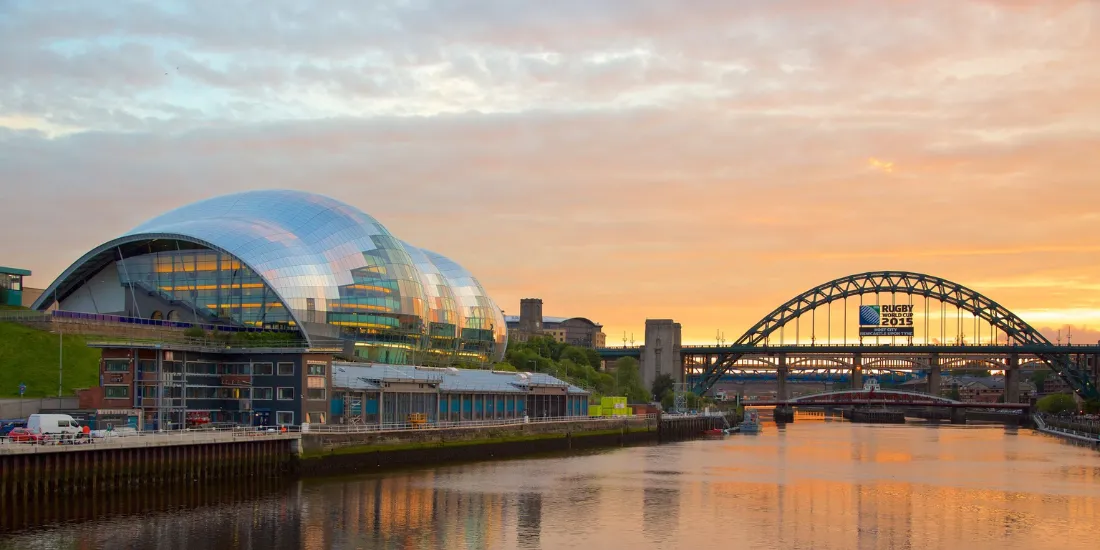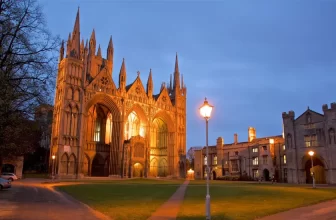
The First Few Steps in Foggy Newcastle
The first thing that hits you when you step off the train at Newcastle Central isn’t the cold-even though, trust me, it’s definitely there-it’s the sound. That low hum of chatter, buses braking outside, the ding ding of the Metro, and seagulls (yes, seagulls because, weirdly, you’re not far from the coast).
I remember dragging my suitcase (one wheel was already busted, naturally) across the cobbled street to my student flat near Jesmond. It had just rained, which is… not rare here. The air smelled like a mix of wet stone and takeaway chips, and a guy on a unicycle playing the accordion greeted me near Grey Street – no joke. I was tired, overwhelmed, and sort of amazed. It hit me right there: this is where I’ll be living. Me. In Newcastle.
If you’re planning an international degree program and looking for a comprehensive study guide in Newcastle upon Tyne, UK, this is where you start. And trust me, it’s more than just uni rankings and visa checklists-this city has a vibe all its own. So let’s get into it.
Why Study in Newcastle upon Tyne in 2026?
Okay, so let’s answer the big why.
Newcastle upon Tyne-or just Newcastle to everyone who lives here-is one of the most affordable and genuinely student-friendly cities in the UK. In 2026, the timing’s actually pretty great. Why? Let me break it down.
Numbers talk:
- There are over 42,000 students in Newcastle, and over 11,000 are international, from over 120 countries.
- QS Best Student Cities 2024 ranked Newcastle in the top 60 globally. That adds serious value to your CV-and your socials if we’re being honest.
- Thanks to the Graduate Route visa, after you finish your degree in 2026, you’ll be eligible to stay for up to 2 years to work in the UK. No job offer required.
Industry & career perks:
Newcastle’s not just about lectures and late-night pizza runs. It’s growing fast in technology, engineering, biomedical sciences, and renewables. There’s a reason companies like Sage, Accenture, and a ton of local startups have offices here. You could actually build your post-graduation path here, not just use it as a stepping stone.
Student life and lifestyle:
Real talk-this place is cheap for the UK. You can get a full night out (drink, dinner, club entry) for the price of one London cocktail (I’m not kidding). People are friendlier than I expected too-your barista will call you “pet” like it’s totally normal.
Why now?
The UK has introduced new funding for tech training, and Newcastle is getting a chunk of that through the Northern Powerhouse initiative. There are new postgrad research incentives brewing. 2026 applications could align perfectly with that boom.
So if you’re eyeing overseas education in the UK with real return on investment, Newcastle’s quietly becoming a very smart move.
Why Newcastle Is a Magnet for International Students
Let me hit you with some truth: not all UK cities treat international students the same. But Newcastle? It just gets it right.
Diversity & welcoming vibe
You’ll meet people from everywhere. My flatmate was from Malaysia, one of my best mates was Nigerian, and my course group project had people from Argentina, Poland, and the UAE. You never feel like the “only one who didn’t grow up here.”
The unis (especially Newcastle University and Northumbria) have dedicated international student offices, visa support, career coaching, and even cultural societies that throw legit parties (the Diwali night was unreal).
Support Systems
Things like free English language support, orientation weeks, and international buddy schemes mean you don’t just land and flounder. You’re set up to actually enjoy it here.
Plus, the city works closely with global recruiters. There’s a pipeline forming between these universities and employers across the UK-and trust me, that matters when you’re staring graduation in the face.
Best Universities and Colleges in Newcastle
Alright, let’s talk Newcastle universities for international students. There are technically quite a few, but these are the big players:
1. Newcastle University
- Ranking: Top 110 in QS 2024
- Known For: Medicine, Engineering, Data Science, Architecture, fine arts
- Tuition: Around £20,000-£26,000/year for international undergrads
- Vibe: Traditional red brick campus with leafy spots and historic buildings mixed with modern labs.
- Location: Smack in the city centre. Metro stops right outside.
- Student Life: Decent mix of work-hard/play-hard. Coffee in the medical school café hits different during exam week.
2. Northumbria University
- Known For: Business, Fashion, Design, Law, Cybersecurity
- Tuition: Around £15,500 – £18,000/year
- Vibe: More modern, creative crowd. Think more project-based, less formal lectures.
- Notable Programs: Master’s in Global Sustainable Business Management is picking up a lot of attention.
- Pros: Their career service is actually super helpful. Loads of sandwich-year opportunities.
3. Newcastle College University Centre
- Known For: Vocational degrees, Applied Sciences, Travel & Tourism
- Tuition: £10,000 – £12,000/year
- Vibe: More hands-on and practical. It’s smaller, more local, but great for people who learn by doing.
4. INTO Newcastle University
- Not a university per se, but if you’re doing a foundation, pre-master’s or language bridging course, this is where you start.
- Great teaching staff, pretty chill community, and easy pathway to full degree programs.
5. QA Higher Education (Partner Institution)
- Offers degree programs for partner universities like Ulster and Roehampton-mainly business-related.
- Tuition: Around £9,250 – £11,500/year.
- For those budget-conscious folks looking for a work-while-you-study balance.
Top Student Accommodation in Newcastle
1. Vita Student – Westgate
- Cost: £185 to £235 per week
- Amenities: Private studios, study rooms, free coffee (!), gym, social events
- Distance: 8 mins walk to Newcastle University
- Pros: High-end, quiet, very international crowd.
- Cons: Expensive. Like…ouch.
2. iQ Collingwood
- Cost: £150-£190 ppw
- Perks: Shared kitchens or studios, game rooms, study zones
- Pro Tip: Available for semester-only stays-great if you’re in Newcastle on exchange.
3. Camden Court
- Cost: £120-£140 ppw
- Perks: Basic, student-budget friendly, walking distance to Northumbria
- Vibe: More local student crowd, less fancy, decent for the price
4. Private Shared Houses in Jesmond/Heaton
- Cost: ~£100-£130 ppw (bills not always included)
- Bigger rooms, better flatmate bonding if you luck out.
- Tip: Search on Rightmove and Facebook groups, but book early-like, now.
Popular Student Areas in Newcastle
Where you live can seriously change your whole experience. Here’s the inside scoop.
Jesmond
- Vibe: Classy, leafy, full of cafes and joggers and brunch spots
- Rent: £110–£140/week
- Distance: 20 mins walk to Newcastle Uni, Metro available
- Pros: Feels safe, lots of students, great food spots
- Cons: More expensive, you will run into your entire seminar group at the Co-op
Sandyford
- Kind of that transition zone between the campus and Jesmond
- Rent: £95–£120/week
- Chill Factor: Low-key, decent, not too loud, not too dull
Heaton
- Rent: £90–£110/week
- Vibe: More local families + budget students, great for shared houses
- Distance: 30 mins walk or 10 min bus
- Pros: Cheaper, big parks, solid for biking
- Cons: Further out, less nightlife
City Centre
- Cost: Pricy. Expect £130–£200/week for studios
- Pros: Live above your lecture halls if you want
- Cons: Noise, cost, and it gets old fast
Cost of Living in Newcastle
Money stress is real, especially as an international student. The good news is Newcastle is one of the cheaper cities in the UK for students. Still, you’ve gotta budget smart.
Here’s what you’re actually looking at, based on 2025 prices heading into 2026:
| Category | Monthly Cost (£) | Comments |
| Accommodation | 400–800 | Shared flats cheaper, studios pricier |
| Groceries | 100–150 | Aldi and Lidl = lifesavers |
| Transport (student) | 45–65 | With student pass or monthly Metrocard |
| Phone & Internet | 30–40 | GiffGaff or Voxi are cheap-ish |
| Dining Out/Socials | 80–150 | Depends on your party level |
| Books & Stationery | 20–40 | Library is your best friend |
| Health Insurance | ~470 one-time | Paid with visa-IHS surcharge |
| Misc. Stuff | 40–70 | Haircuts, toothpaste, panic coffees |
Estimated Monthly Total:
- Low budget: ~£750/month
- Mid-range: ~£900–£1,100
- High spenders: £1,300+
Where People Overspend:
- Uber (just don’t. The Metro runs until midnight.)
- Eating out constantly (yes Greggs is tempting)
- Buying all course books new (Amazon + uni library = win)
Budget-Friendly Tips:
- Download Too Good To Go – surprise meals from £2
- Get the 16-25 Railcard even if you’re older (if you’re in full-time education)
- Ask older students for used uni books or PDFs
- Join Facebook groups for freecycle stuff-people give away rice cookers, kettles, you name it
Scholarships and Financial Aid
Alright, here’s the deal-scholarships DO exist, but not all are shouted from the rooftops.
University-Specific Scholarships:
Newcastle University
- Vice-Chancellor’s International Scholarships: £4,000–£10,000 depending on course
- PG Global Scholarships: Especially for master’s in business, STEM
Northumbria University
- Northumbria Global Scholarship: Up to £3,000 automatic for undergrads/postgrads
- Country-specific awards (check Nigeria, India, Southeast Asia)
Government & External Funding:
- Chevening: For postgrad students from select countries
- Commonwealth Scholarships: Full tuition + stipend
- British Council GREAT Scholarships: For certain countries and universities
Tips to Actually Get Them:
- Get your application in early-some run out months before the deadline
- Spend real time on your personal statement-show impact, not just grades
- Smaller, department-level awards are less competitive-ask your course contact
- Use sites like PostgraduateFunding.com or your embassy’s education office
How to Apply – Step-by-Step (2026 Intake)
Let’s break this down so your brain doesn’t melt.
Step 1: Start Researching
Time: October–December 2025
Shortlist unis using UCAS, university sites, webinars, or events like the British Council’s Study UK fair.
2: Prepare Documents
Must-haves:
- Transcripts
- TOEFL/IELTS score (if required)
- Letters of recommendation (get these early!)
- Personal statement/SOP
- Passport
3: Write Your SOP
Real talk? Make it personal, not generic.
- Why Newcastle or that course? Name-drop profs or research if you can.
- Failure or challenge you’ve overcome = gold (stick the landing though)
4: Submit Applications
- UCAS: For undergrad, deadline is 31 January 2026
- Postgrad: Direct to uni; many close around March-April
5: Wait for Offers
You could wait 3 to 8 weeks, so check your email (and spam folder) daily.
6: Accept & Pay Deposit
Usually starts from £1,000. Once you accept, they’ll send your CAS letter for visa application.
Visa and Work Rules in 2026 (It’s Doable, Don’t Panic)
Visas honestly sound worse than they are. But yeah-paperwork = pain.
Student Visa (UK Tier 4) Checklist
- Get CAS from your university
- Pay the visa application fee (£490) + IHS surcharge (£470/year)
- Show proof of funds = £1,023/month × 9 months = ~£9,207
- Valid passport + English test scores
Processing Time
- Avg: 3 weeks
- Express option: available, but pricey
Common Mistakes
- Wrong proof-of-funds format
- Name mismatch (yes, this matters)
- Leaving it too late (apply minimum 2 months before course starts)
Work While Studying
- 20 hours/week during studying, full-time during breaks
- Retail, on-campus barista jobs, digital gigs if legal
- Post-study: 2-year Graduate Route available after 2026
Local Transport in Newcastle: It Just Works
You’ll probably end up using the Metro first thing. It’s fast, colour-coded, weirdly cute.
Options for Students:
- Tyne & Wear Metro Student Card: ~£36/month
- Bus passes via Arriva or Stagecoach: around £14/week
- Cycling? City has paths, parking, but weird hills in the west.
Pro Tips:
- Download ‘Moovit’ or ‘Metro Now’ for live transport help
- Buy the Network One ticket if you use metro and bus
- Avoid Uber unless it’s 2 a.m. and you’re 17% battery and cold (we’ve all been there)
Daily Life, Food, and the Real Vibes
Okay, honesty time. Newcastle student life is fun-but you make it what it is.
Typical Week:
- Classes during the day
- Study in Philip Robinson Library (Newcastle Uni) or City Campus East (Northumbria)
- Pubs like The Hancock or cafes like Flat Caps Coffee for chill hangs
- Netflix and last-minute assignment panic on Sunday
Food Culture
- Greggs is everywhere and you’ll end up addicted
- Chicken Cottage (post-night-out haven)
- Chinatown near Stowell Street = underrated
- Jesmond Dene House if you wanna feel bougie for no reason
Social Side
- Join societies (I tried Archery once at 9 a.m…never again)
- International student mixers are worth showing up for
- Digital Fridays or Jungle at Cosmic Ballroom for club nights
Internship and Career Opportunities
Let’s talk jobs.
Where to Find Work:
- Uni portals (myCareer, CareerConnect, etc.)
- Indeed Student, Bright Network, RateMyPlacement
- North East Ambition platform
Industries That Hire Grads:
- Tech and cyber (thanks to Newcastle Helix, a tech district)
- Health and biomedical (NHS and private clinics)
- Sustainability (climate startups are legit here)
- Big firms: Procter & Gamble, Sage, Accenture, EY
Get networking early. LinkedIn wasn’t built for fun, but it can land a job.
Short-Term Study Abroad Options (Yes, They Exist)
Don’t want a full three-year degree? Consider:
Summer Schools:
- Offered by Newcastle and Northumbria – 2-to-8-week programs in business, English, engineering
- Cost: £1,500–£3,500 total (incl. housing)
Exchange Programs:
- If you’re from a partner uni (i.e., from Canada, Singapore, Australia), you can apply for a semester or year abroad
- Same uni perks, shorter time = less pressure
Great for getting a taste of overseas education in the UK.
Application Timeline for 2026 Intake
Here’s your month-by-month plan starting now (October 2025):
| Month | What to Do |
| Oct–Nov ’25 | Shortlist unis, start documents |
| Dec ’25 | Draft SOP, ask for rec letters |
| Jan ‘26 | UG UCAS deadline (end of Jan) |
| Feb–Mar ’26 | Submit postgrad direct applications |
| Mar–May ’26 | Apply for scholarships |
| May–June ’26 | Receive offers, choose a uni |
| June–July ’26 | Apply for visa, book accommodation |
| Aug–Sep ’26 | Prepare for departure, pack, say goodbyes |
Public vs Private Universities (Quick Compare)
| Factor | Public (e.g., Newcastle, Northumbria) | Private (QA, others) |
| Tuition | £15K–£26K | £9K–£12K |
| Prestige/Ranking | Higher | Varies |
| Class Size | Larger group lectures | Smaller classes |
| Research Opportunities | More available | Limited |
| Experience | Full campus life | More urban/central buildings |
| Entry Requirements | More competitive | Easier access |
Final Thoughts – So, Is Newcastle Right for You?
By now, you’ve probably got a brain full of info. So here’s the TL;DR takeaway:
Why Newcastle?
✅ Affordable-ish
✅ Legit unis
✅ Welcoming people
✅ Career options that go beyond London
✅ Actual student vibe, not tourist-y hype
Who it’s perfect for:
- First-time solo travellers
- Students on a budget
- Anyone craving both peace and fun
- Those looking for real cultural mix
Might not be your jam if:
- You need sunshine
- You prefer mega-cities (look at Manchester or London)
- You hate rain (it rains a lot, I warned you)
Pro Tips From Someone Who’s Been There:
- Get a raincoat, not an umbrella (the wind will end it)
- Go to Fresher’s Fairs even if you’re postgrad
- Explore outside the city-Durham day trip, Tynemouth beach, etc.
- Don’t wait until 3rd year to use career services
- Say yes more often than no (except to dodgy flat listings)
Top FAQs About Studying in Newcastle
Not compared to London or Edinburgh. Average monthly cost is around £850–£1,100 depending on accommodation.
Yes-up to 20 hours a week during term and full-time during breaks.
Generally, yes. Use common sense at night, but the city centre and student areas are very safe.
Yes, with the Graduate Route visa you get 2 years to work in the UK.
Yes-internal and external. But apply early, and don’t just look at the “main” uni website.
Now. Seriously. By December, you should already be halfway into prepping.
If you’ve made it this far-hey, you’re serious. Which is good, because Newcastle’s waiting, and you’re more ready than you think.
Got questions I didn’t answer? Or want help planning your move? Drop a comment below or check out studyabroadadvice.com. You’ve got this.






